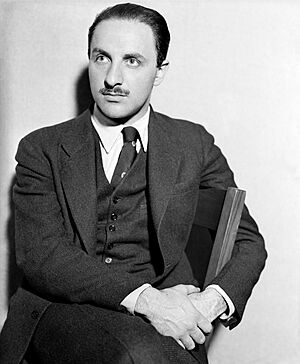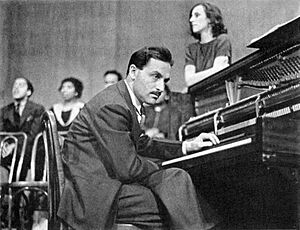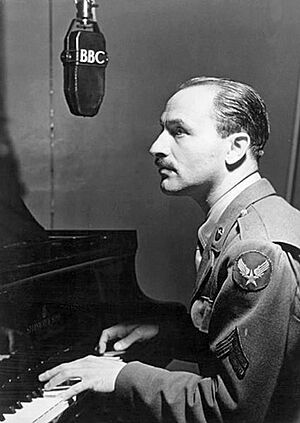Marc Blitzstein facts for kids
Quick facts for kids
Marc Blitzstein
|
|
|---|---|

Blitzstein in 1937
|
|
| Born |
Marcus Samuel Blitzstein
March 2, 1905 Philadelphia, Pennsylvania
|
| Died | January 22, 1964 (aged 58) |
| Cause of death | Homicide |
| Occupation |
|
| Years active | 1926–1964 |
Marcus Samuel Blitzstein (born March 2, 1905 – died January 22, 1964) was an American composer, lyricist, and writer of opera stories (librettist). He became well-known in 1937. This happened when his musical The Cradle Will Rock was stopped by the government. The musical supported worker unions.
Blitzstein is famous for The Cradle Will Rock. He is also known for his English version of The Threepenny Opera by Bertolt Brecht and Kurt Weill. His other works include the opera Regina. This was based on Lillian Hellman's play The Little Foxes. He also created the Broadway musical Juno. This musical was based on Seán O'Casey's play Juno and the Paycock. Another important work was No for an Answer.
Blitzstein also translated and adapted other works. These include Brecht and Weill's musical play Rise and Fall of the City of Mahagonny. He also adapted Brecht's play Mother Courage and Her Children. This play had music by Paul Dessau. Blitzstein wrote music for films too. Examples are Surf and Seaweed (1931) and The Spanish Earth (1937). He also wrote two songs for the play Toys in the Attic in 1960.
Contents
His Life and Music
Marc Blitzstein was born in Philadelphia on March 2, 1905. His parents were wealthy. He showed great musical talent from a young age. By age seven, he had performed a Mozart piano concerto. He later studied piano with Alexander Siloti. Siloti was a student of famous composers like Tchaikovsky and Liszt. Blitzstein played his first professional piano concert at age 21. He performed Liszt's E-flat Piano Concerto with the Philadelphia Orchestra.
After studying at the Curtis Institute of Music, he went to Europe. He continued his music studies in Berlin with Arnold Schoenberg. He also studied in Paris with Nadia Boulanger. In his early career, Blitzstein believed that true art was only for a small, smart group of people. He often criticized composers like Respighi, Ravel, and Kurt Weill. He felt they made their music too simple to reach more people.
His early works were mostly for piano. These include the Piano Sonata (1927) and the Piano Concerto. These pieces were very rhythmic and often used strong, clashing sounds. They were quite different from the style of Schoenberg.
The Cradle Will Rock
The musical The Cradle Will Rock had a very dramatic first performance. It was a pro-labor union play. The show was supposed to open on June 16, 1937, at the Maxine Elliott Theatre. However, the Works Progress Administration (WPA) locked the cast out. The WPA was a government agency that had funded the show.
So, the actors and musicians walked with the audience to a nearby theater, the Venice Theater. There, they performed the show without costumes or sets. The actors and musicians sat among the audience. Blitzstein narrated the story from the piano. This was done to get around union rules that might have stopped the performance.
In 1939, Leonard Bernstein led a new performance of the play at Harvard. He narrated from the piano, just like Blitzstein. Blitzstein attended this performance. After that, he and Bernstein became close friends. Bernstein later said that Blitzstein's work greatly helped American musical theater. A 1999 film called Cradle Will Rock was based on this event.
Later Works and Challenges
Blitzstein created many other important works. These include the radio play I've Got the Tune. He also wrote The Airborne Symphony (1946) and the opera Regina (1949). Other works were Reuben, Reuben (1955) and Juno (1959).
When he died, Blitzstein was working on an opera called Idiots First. It was based on a story by Bernard Malamud. He also planned a big opera called Sacco and Vanzetti. Other composers, like Leonard Lehrman, finished these works after Blitzstein's death.
In 1958, Blitzstein was called to appear before the U.S. House Committee on Un-American Activities (HUAC). This committee investigated people suspected of being involved with communism. Blitzstein admitted he had been part of a political group (ending in 1949). However, he refused to name other people or cooperate further with the committee. He was called for another public meeting, but he was not asked to speak.
In 1964, Blitzstein was visiting Martinique. He died there at the age of 58 due to a violent act. He is buried in Philadelphia.
Personal Life
Blitzstein married novelist Eva Goldbeck on March 2, 1933. They did not have children. Eva died in 1936. Her death greatly affected Blitzstein. It led him to focus intensely on creating The Cradle Will Rock.
Selected Works
- Triple-Sec (1928)
- Garrick Gaieties (1930) — a show with music — he was a contributing composer
- The Harpies, opera (1931)
- The Condemned (1932, never produced)
- Parade (1935) — a show with music — he was a featured songwriter
- The Spanish Earth (1937) — composer with Virgil Thomson
- Caesar (1937) — play revival — wrote music for the play
- Pins and Needles (1937) — a show with music — helped write the story
- The Cradle Will Rock (1937) — musical — composer, lyricist, story writer, director, pianist, and actor
- Danton's Death (1938) — play revival — wrote music for the play
- I've Got the Tune (1938) — radio opera
- No for an Answer (1941)
- Native Land (1942)
- The Airborne Symphony (1946) — symphony — composer
- Another Part of the Forest (1946) — play — wrote music for the play
- Androcles and the Lion (1946) — play revival — wrote music for the play
- Regina (1949) — opera — composer, music arranger, and story writer
- Let's Make an Opera (1950) — special performance — director
- King Lear (1950) — play revival — wrote music for the play
- The Threepenny Opera (1954) — operetta revival — translated Bertolt Brecht's story and lyrics into English
- Reuben, Reuben (1955) — opera
- Juno (1959) — musical — composer, lyricist, and co-arranger
- Toys in the Attic (1960) — play — featured songwriter for two songs
- Tales of Malamud (two one-act operas): Idiots First (1963, unfinished, completed by Leonard Lehrman, 1973) and The Magic Barrel (1964, unfinished)
- Sacco and Vanzetti (1964, unfinished opera, completed by Leonard Lehrman, 2001)
Images for kids
See also
 In Spanish: Marc Blitzstein para niños
In Spanish: Marc Blitzstein para niños
 | Janet Taylor Pickett |
 | Synthia Saint James |
 | Howardena Pindell |
 | Faith Ringgold |






